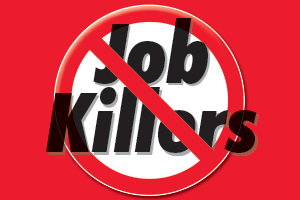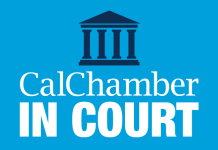 A California Chamber of Commerce job killer bill that threatens thousands of high-wage jobs throughout California and could increase the state’s reliance on foreign oil imports will be considered by the Senate Natural Resources and Water Committee today.
A California Chamber of Commerce job killer bill that threatens thousands of high-wage jobs throughout California and could increase the state’s reliance on foreign oil imports will be considered by the Senate Natural Resources and Water Committee today.
AB 345 (Muratsuchi; D-Torrance) threatens to eliminate thousands of high-paying California jobs and result in California importing even more foreign oil and higher gas prices by politicizing the ongoing regulatory process of the California Geologic Energy Management Division, or CalGEM, regarding additional regulatory requirements on oil and gas extraction sites. By arbitrarily predisposing the setback requirements in statute, the bill undermines CalGEM’s independent process of considering best available science before the agency has even finished its analysis.
Background
CalGem announced on November 19, 2019 a series of initiatives and formal rulemaking to safeguard public health and the environment, and advance California’s goal to become carbon-neutral by 2045, including rulemaking to prohibit oil and gas activities within close proximity of homes, schools, hospitals, and parks.
Undermines Regulatory Process
AB 345 puts the cart before the horse by requiring CalGem to adopt regulations likely requiring the exact same 2,500 feet minimum setback requirements that existed in the prior versions of the bill. By predisposing what the setback requirement should be before the agency completes or even begins its analysis, the bill potentially forces the agency to adopt arbitrary setback requirements that are not based on best available science.
CalGem already announced that it will conduct formal rulemaking to consider a range of protective measures, including prohibiting oil and gas activities within close proximity of homes, schools, hospitals, and parks. The pre-regulatory processes began in 2020, with new and modified rules anticipated. AB 345 politicizes and undermines CalGem’s regulatory process with arbitrary requirements that may not be based on best available science or data to inform the agency about what new protective requirements near oil and gas extraction sites are needed.
Does Not Reduce Oil, Gas Demands
AB 345 does nothing to reduce California’s oil and gas energy demands—it merely drives production out of California and forces the state to rely on even more foreign oil imports.
According to the California Energy Commission, California is relying more on foreign oil than at any time since the agency started tracking it in 1982. In 2018, California imported 370 million barrels, or 57% of the state’s crude oil supply, from foreign nations like Saudi Arabia (37%), Colombia (13%), and Iraq (8%). Compare this rate to 1992, when California imported just 33 million barrels, only 5% of its supply.
Banning in-state oil and gas production only to shift suppliers to foreign oil regimes with abysmal environmental and human-rights records fails to address climate change, as all it really does is trade greenhouse gas emissions here in California for greenhouse gas emissions elsewhere.
Kills High-Wage Jobs
AB 345 threatens approximately 6,000 high-wage jobs in Los Angeles County alone. Arbitrary minimum setback requirements prescribed in the bill would likely shut down approximately 87% of all oil and gas wells in the City of Los Angeles and 66% of all oil and gas wells in Los Angeles County. In addition, the Assembly Appropriations Committee estimated that AB 345’s setback requirements could cost California up to $4 billion in lost state revenue and subjects the state to significant legal liability under the takings clause of the U.S. Constitution.
At a time when California is reeling from the economic impacts from the COVID-19 pandemic, injecting arbitrary requirements that subvert CalGEM’s regulatory authority and threaten to eliminate thousands of high paying jobs is unwise.
Staff Contact: Adam Regele


